Research News
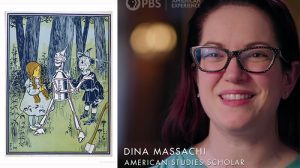
UNC Charlotte faculty member and alumna Dina Massachi has followed a long and winding road to build her extensive knowledge and understanding of L. Frank Baum, author of the enduring classic, The Wonderful Wizard of Oz. She is one of the experts chosen to provide insights on Baum in a PBS documentary “American Oz,” which premieres on April 19.
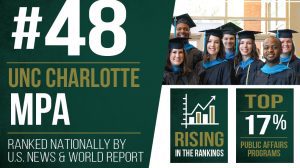
The latest U.S. News & World Report rankings place the Gerald G. Fox Master of Public Administration at #48 nationally, with the program moving into top 17 percent of all ranked public affairs programs. For UNC Charlotte’s nationally accredited MPA program, its ranking marks a 19% increase over last year’s results.
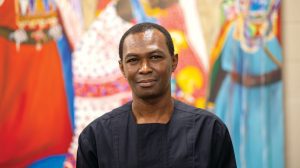
Akin Ogundiran, a Chancellor’s Professor and professor of Africana Studies, Anthropology and History, is the 2021 recipient of the First Citizens Bank Scholars Medal, UNC Charlotte’s most prestigious faculty award, in recognition of excellence in research. undiran is a renowned archaeologist and transdisciplinary scholar-teacher who has consistently used diverse research methods in the humanities, social sciences and physical sciences to study African and African Diaspora history, with an emphasis on the Yoruba civilization.

To most observers, the storming of the U.S. Capitol on Jan. 6, 2021, illustrates how extremist groups have increased in power and visibility. UNC Charlotte’s Shannon Reid, associate professor of Criminal Justice and Criminology, describes the criminality and violence exhibited during the Capitol riots as a major concern.

New UNC Charlotte social and behavioral sciences research on gender inequality indicates that fewer leadership prospects in the workplace apply even to women who show the most promise early on in their academic careers.

Former FEMA Administrator Brock Long will headline UNC Charlotte’s third annual “Talking Policy in the Queen City” symposium on Feb. 24, hosted by the Public Policy Ph.D. and MPA programs with UNC Charlotte Urban Institute.

Eighteen researchers in UNC Charlotte’s College of Liberal Arts & Sciences (CLAS) are among the top 2% percent of the world’s most cited researchers, detailed in a Stanford University study. CLAS researchers from five academic departments represent almost 45 percent of the UNC Charlotte researchers on the list.
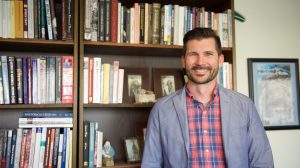
Jason Black, chair of the Department of Communication Studies, in early 2020 received a Fulbright award in support of a cross-cultural study of the indigenous mascotting controversy in Canadian and U.S. cultures of sport. Black was based at Brock University in St. Catharines, Ontario, when the COVID-19 pandemic cut his trip short. Yet, he’s stayed on track to publish his second book on mascotting issues.

Despite the critical nature of authorship to researchers, their institutions and the public, just 24% of U.S. doctoral-granting universities with very high or high research activity have published institutional authorship policies, UNC Charlotte researchers Lisa Rasmussen and George Banks and their colleagues have discovered.
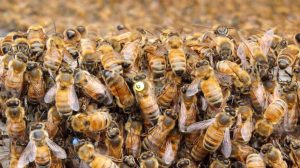
As people react to the 2020 U.S. presidential election results, we have turned to the animal kingdom to see how animal societies make decisions and resolve conflict. We asked CLAS researchers to consider what we can learn from animal societies. Alan Rauch, an English professor, earned degrees in zoology and literature, and he studies and writes about dolphins. Stanley Schneider, a biologist, studies honey bees and their hive behavior. Anthropologist Lydia Light researches gibbons and other primates.
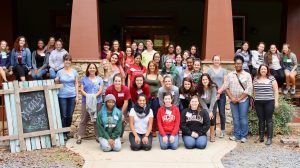
A mentoring program co-led by UNC Charlotte researcher Sandra Clinton that aims to retain undergraduate women in the geosciences is on the shortlist for the international Nature Research Awards for Inspiring and Innovating Science. The program also has received almost $3 million in new NSF funding.

A multi-discipline, multi-university project housed at UNC Charlotte and led by political scientist Jason Windett seeks to develop an easy-to-search hub of vast amounts of data on life-affecting issues, complete with analytical tools for easy visualization of the data.

As pandemic restrictions begin to lift and cities start to bustle, we take a closer look at UNC Charlotte research into urban intensification and its impact on forest birds. This study by UNC Charlotte landscape ecologist Sara Gagné with two alumni and a colleague suggests ways to help forest birds in cities.

Colleen Hammelman, assistant professor in the Department of Geography and Earth Sciences, has received a prestigious National Science Foundation Faculty Early Career Development Program (CAREER) Grant to study population change and gentrification in urban foodscapes. Her five-year funding is expected to total $461,555.

Since 2012, the somewhat unusual research pairing of a geologist and mechanical engineer at UNC Charlotte has led to some important scientific results, and has recently earned recognition of their work with a top award for interdisciplinary research and publication.

As communities relax COVID-19 restrictions, a study by UNC Charlotte geographer Eric Delmelle and two of his former doctoral students could provide decision-makers with timely data about spikes in COVID-19 cases to help guide their decisions.

An interdisciplinary team from UNC Charlotte has received a $29,000 Research Grant in the Arts from the National Endowment for the Arts (NEA) for the project “Arts-based social mobility: Exploring cultural capital in Charlotte, NC.” Sociology Associate Professor Vaughn Schmutz will lead the team, which includes faculty and staff from the College of Arts + Architecture.

UNC Charlotte’s Gerald G. Fox Master of Public Administration program and Clinical Health Psychology doctoral program in the College of Liberal Arts & Sciences have earned high marks in the U.S. News & World Report’s 2021 rankings.